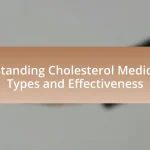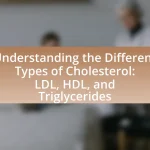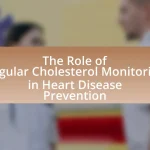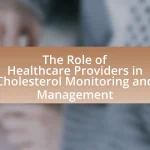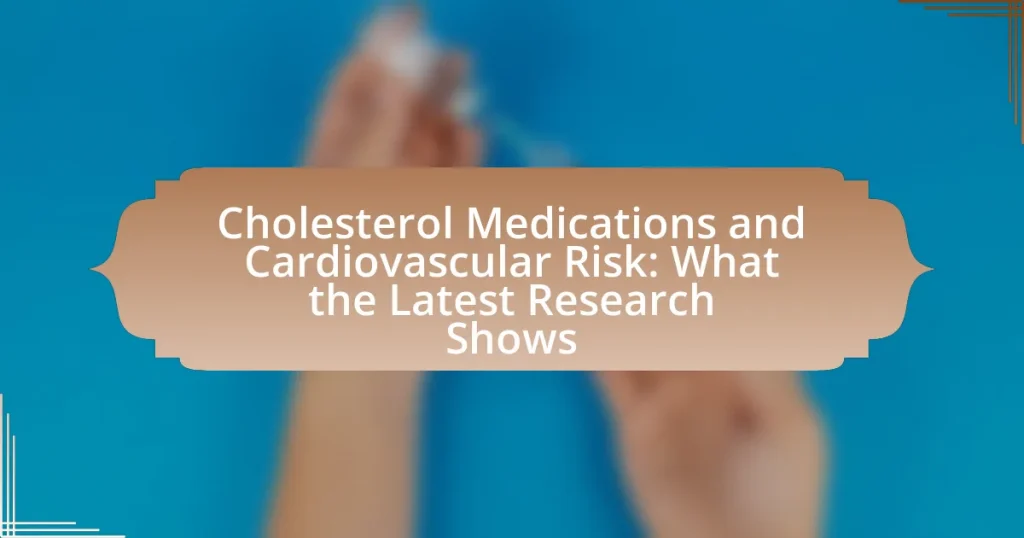Cholesterol medications, particularly statins, play a crucial role in reducing cardiovascular risk by lowering low-density lipoprotein (LDL) cholesterol levels in the bloodstream. This article examines the mechanisms of action of these medications, their effectiveness in preventing heart attacks and strokes, and the various types available, including newer agents like PCSK9 inhibitors. It also explores the relationship between cholesterol levels and cardiovascular disease, recent research findings on treatment efficacy, potential side effects, and the importance of lifestyle modifications in enhancing medication effectiveness. Additionally, it emphasizes the need for patient-provider communication to optimize treatment plans tailored to individual health needs.
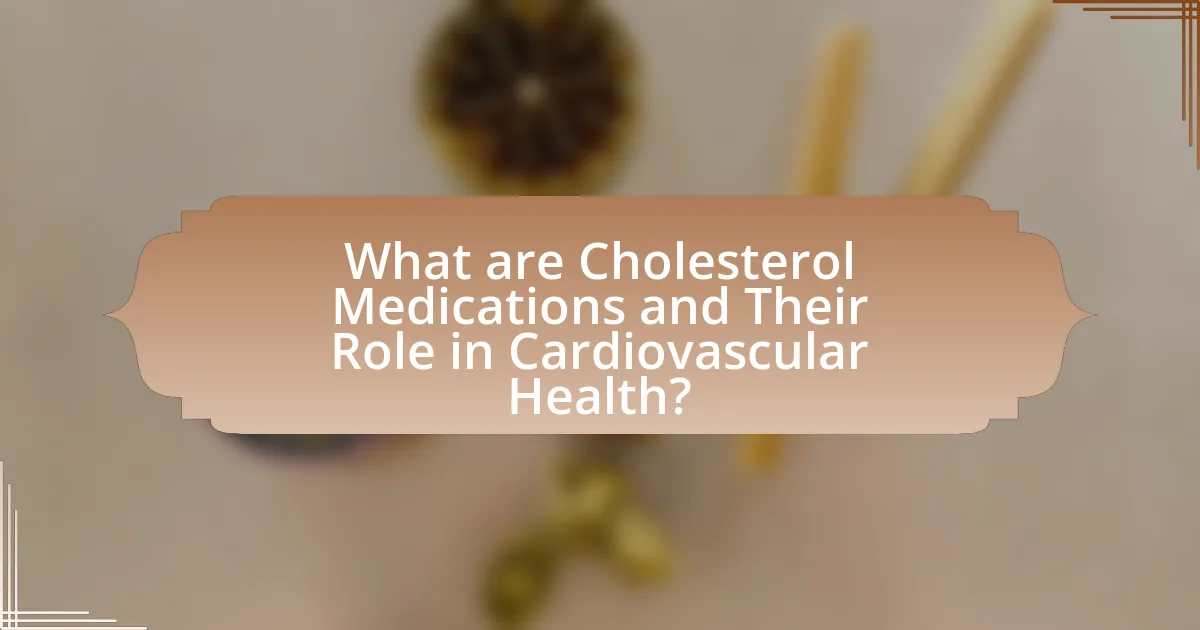
What are Cholesterol Medications and Their Role in Cardiovascular Health?
Cholesterol medications, primarily statins, are drugs designed to lower levels of low-density lipoprotein (LDL) cholesterol in the bloodstream, thereby reducing the risk of cardiovascular diseases. These medications work by inhibiting the enzyme HMG-CoA reductase, which plays a central role in cholesterol synthesis in the liver. Research indicates that statins can decrease the incidence of heart attacks and strokes by as much as 30% to 50% in high-risk populations, as evidenced by large-scale studies such as the JUPITER trial, which demonstrated significant cardiovascular event reduction in patients with elevated C-reactive protein levels. Additionally, cholesterol medications can improve endothelial function and stabilize atherosclerotic plaques, further contributing to cardiovascular health.
How do cholesterol medications work to lower cardiovascular risk?
Cholesterol medications, primarily statins, lower cardiovascular risk by reducing low-density lipoprotein (LDL) cholesterol levels in the bloodstream. Statins inhibit the enzyme HMG-CoA reductase, which plays a crucial role in cholesterol synthesis in the liver, leading to decreased production of LDL cholesterol. This reduction in LDL cholesterol is associated with a significant decrease in the risk of heart attacks and strokes; for instance, studies have shown that statin therapy can reduce the risk of major cardiovascular events by approximately 25% to 30% in high-risk populations. Additionally, cholesterol medications may have anti-inflammatory effects and improve endothelial function, further contributing to cardiovascular risk reduction.
What types of cholesterol medications are available?
There are several types of cholesterol medications available, including statins, bile acid sequestrants, cholesterol absorption inhibitors, and PCSK9 inhibitors. Statins, such as atorvastatin and simvastatin, are the most commonly prescribed and work by reducing the liver’s production of cholesterol. Bile acid sequestrants, like cholestyramine, help lower cholesterol levels by binding bile acids in the intestine. Cholesterol absorption inhibitors, such as ezetimibe, reduce the amount of cholesterol absorbed from the diet. PCSK9 inhibitors, including alirocumab and evolocumab, are newer medications that significantly lower LDL cholesterol levels by enhancing the liver’s ability to remove cholesterol from the blood. These medications have been shown to effectively reduce cardiovascular risk in patients with high cholesterol levels.
How do statins differ from other cholesterol-lowering drugs?
Statins differ from other cholesterol-lowering drugs primarily in their mechanism of action; they inhibit the enzyme HMG-CoA reductase, which plays a crucial role in cholesterol synthesis in the liver. This specific action leads to a significant reduction in low-density lipoprotein (LDL) cholesterol levels, which is a key factor in reducing cardiovascular risk. In contrast, other cholesterol-lowering medications, such as bile acid sequestrants and fibrates, operate through different mechanisms, such as binding bile acids or increasing lipoprotein lipase activity, respectively. Statins have also been shown to provide additional cardiovascular benefits beyond cholesterol reduction, including plaque stabilization and anti-inflammatory effects, which are not typically observed with other classes of cholesterol-lowering drugs.
What is the relationship between cholesterol levels and cardiovascular disease?
Cholesterol levels are directly related to cardiovascular disease, with high levels of low-density lipoprotein (LDL) cholesterol being a significant risk factor. Elevated LDL cholesterol can lead to the formation of plaques in arteries, resulting in atherosclerosis, which increases the likelihood of heart attacks and strokes. Research indicates that lowering LDL cholesterol through lifestyle changes or medications, such as statins, can reduce the risk of cardiovascular events. For instance, a meta-analysis published in the Journal of the American College of Cardiology found that for every 1% reduction in LDL cholesterol, there is an associated 1% decrease in the risk of major cardiovascular events.
How does high cholesterol contribute to heart disease?
High cholesterol contributes to heart disease by promoting the formation of plaque in the arteries, which narrows and hardens them, a condition known as atherosclerosis. This buildup of plaque can restrict blood flow to the heart and other organs, increasing the risk of heart attacks and strokes. Research indicates that elevated levels of low-density lipoprotein (LDL) cholesterol are particularly harmful, as they are the primary contributors to plaque formation. According to the American Heart Association, high LDL cholesterol levels are a significant risk factor for cardiovascular disease, with studies showing that for every 1% increase in LDL cholesterol, the risk of heart disease increases by approximately 1%.
What are the recommended cholesterol levels for optimal heart health?
The recommended cholesterol levels for optimal heart health are as follows: total cholesterol should be less than 200 mg/dL, low-density lipoprotein (LDL) cholesterol should be less than 100 mg/dL, and high-density lipoprotein (HDL) cholesterol should be 60 mg/dL or higher. These levels are supported by guidelines from the American Heart Association, which indicate that maintaining these cholesterol levels can significantly reduce the risk of cardiovascular disease.

What Does Recent Research Reveal About Cholesterol Medications?
Recent research reveals that cholesterol medications, particularly statins, significantly reduce cardiovascular events and mortality in high-risk populations. A meta-analysis published in the Journal of the American College of Cardiology in 2023 demonstrated that statin therapy lowers the risk of heart attacks and strokes by approximately 25% in individuals with elevated cholesterol levels. Additionally, studies indicate that newer cholesterol-lowering agents, such as PCSK9 inhibitors, provide further risk reduction, particularly in patients who are statin-intolerant or have familial hypercholesterolemia. These findings underscore the importance of cholesterol medications in managing cardiovascular risk effectively.
What are the latest findings on the effectiveness of cholesterol medications?
Recent findings indicate that cholesterol medications, particularly statins, significantly reduce cardiovascular events in high-risk populations. A meta-analysis published in the Journal of the American College of Cardiology in 2023 demonstrated that statin therapy lowers the risk of heart attacks and strokes by approximately 25% in individuals with elevated cholesterol levels. Additionally, newer classes of cholesterol-lowering drugs, such as PCSK9 inhibitors, have shown even greater efficacy, reducing LDL cholesterol levels by up to 60% and further decreasing cardiovascular risk. These advancements underscore the ongoing effectiveness of cholesterol medications in managing cardiovascular health.
How have recent studies changed the understanding of cholesterol treatment?
Recent studies have shifted the understanding of cholesterol treatment by emphasizing the importance of individualized therapy rather than a one-size-fits-all approach. Research, such as the 2020 study published in the Journal of the American College of Cardiology, indicates that factors like genetic predisposition, age, and overall cardiovascular risk should guide treatment decisions. This study found that patients with a higher genetic risk for heart disease may benefit more from aggressive cholesterol-lowering strategies, while others may not require intensive treatment. Additionally, findings from the IMPROVE-IT trial demonstrated that adding ezetimibe to statin therapy significantly reduced cardiovascular events, reinforcing the need for tailored treatment plans based on patient-specific risk profiles.
What are the implications of these findings for patient care?
The findings regarding cholesterol medications indicate that they can significantly reduce cardiovascular risk in patients with high cholesterol levels. This suggests that healthcare providers should prioritize the use of these medications in at-risk populations to prevent heart disease and related complications. Research has shown that statins, for example, lower LDL cholesterol and reduce the incidence of heart attacks and strokes, thereby improving patient outcomes. Consequently, integrating cholesterol-lowering therapies into treatment plans can enhance overall cardiovascular health and reduce healthcare costs associated with managing heart disease.
What are the potential side effects of cholesterol medications?
Cholesterol medications, particularly statins, can cause several potential side effects. Common side effects include muscle pain, liver damage, digestive problems, and increased blood sugar levels. Statins, for instance, have been associated with myopathy, which affects approximately 1 in 10,000 users, and can lead to rhabdomyolysis in rare cases. Liver enzyme elevations occur in about 1% to 3% of patients, necessitating regular monitoring. Additionally, some individuals may experience gastrointestinal issues such as nausea or diarrhea. These side effects highlight the importance of discussing risks with healthcare providers before starting treatment.
How can patients manage the side effects of these medications?
Patients can manage the side effects of cholesterol medications by adhering to a few key strategies. These include communicating openly with healthcare providers about any adverse effects experienced, which allows for potential adjustments in dosage or medication type. Additionally, patients can implement lifestyle changes such as adopting a heart-healthy diet, engaging in regular physical activity, and maintaining a healthy weight, all of which can mitigate side effects and enhance overall treatment efficacy. Research indicates that lifestyle modifications can significantly improve cholesterol levels and reduce the need for higher medication doses, thereby minimizing side effects.
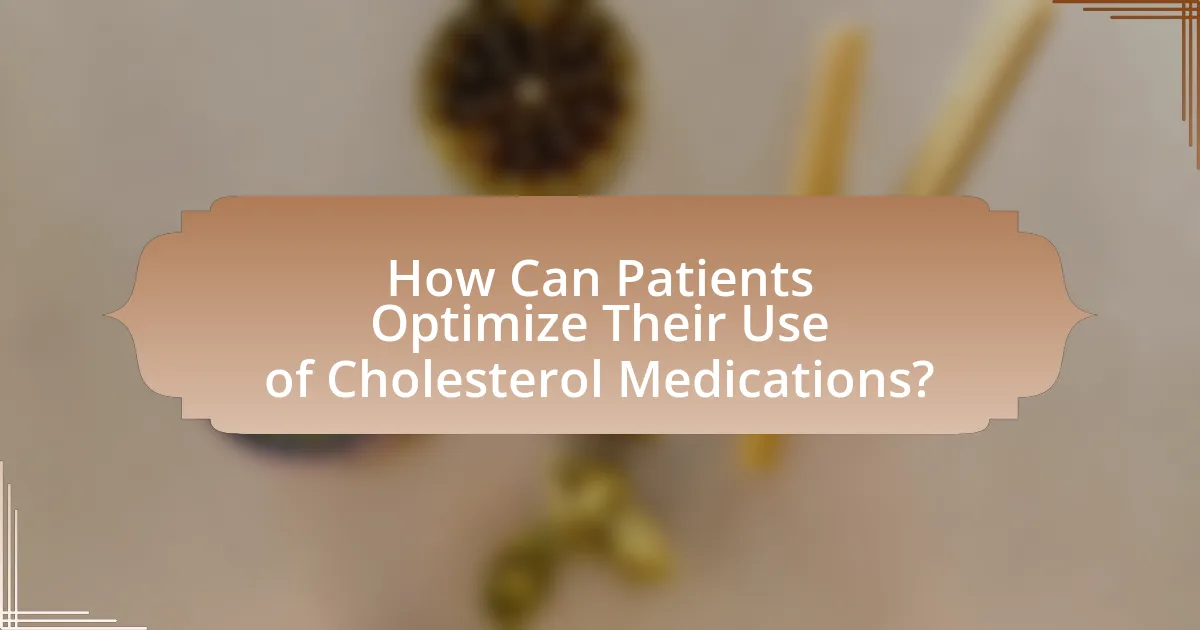
How Can Patients Optimize Their Use of Cholesterol Medications?
Patients can optimize their use of cholesterol medications by adhering to prescribed dosages, maintaining a healthy lifestyle, and regularly monitoring cholesterol levels. Adherence to medication regimens is crucial; studies show that consistent use of statins can reduce cardiovascular events by up to 30%. Additionally, incorporating a balanced diet rich in fruits, vegetables, and whole grains, along with regular physical activity, can enhance the effectiveness of these medications. Regular check-ups with healthcare providers to monitor lipid levels and adjust treatment as necessary further supports optimal management of cholesterol levels.
What lifestyle changes can enhance the effectiveness of cholesterol medications?
Adopting a heart-healthy lifestyle can significantly enhance the effectiveness of cholesterol medications. Key changes include following a diet low in saturated fats and cholesterol, which can help lower LDL cholesterol levels; engaging in regular physical activity, as exercise can improve overall cardiovascular health and aid in weight management; and quitting smoking, which can improve HDL cholesterol levels and reduce cardiovascular risks.
Research indicates that a Mediterranean diet, rich in fruits, vegetables, whole grains, and healthy fats, can further support the efficacy of cholesterol-lowering medications. A study published in the Journal of the American College of Cardiology found that lifestyle modifications, including dietary changes and increased physical activity, can lead to a 30-40% reduction in cardiovascular events, complementing the effects of statin therapy.
How does diet impact cholesterol levels and medication efficacy?
Diet significantly impacts cholesterol levels and the efficacy of cholesterol medications. Consuming a diet high in saturated fats and trans fats can raise low-density lipoprotein (LDL) cholesterol, while a diet rich in fruits, vegetables, whole grains, and healthy fats can lower LDL cholesterol levels. Research indicates that dietary changes can enhance the effectiveness of statins, a common class of cholesterol-lowering medications. For instance, a study published in the Journal of the American College of Cardiology found that patients who adhered to a Mediterranean diet experienced a greater reduction in LDL cholesterol when using statins compared to those with a standard diet. This demonstrates that dietary choices not only influence baseline cholesterol levels but also interact with medication effectiveness, underscoring the importance of a heart-healthy diet in managing cholesterol.
What role does exercise play in managing cholesterol and cardiovascular risk?
Exercise plays a crucial role in managing cholesterol levels and reducing cardiovascular risk. Regular physical activity helps increase high-density lipoprotein (HDL) cholesterol, known as “good” cholesterol, while simultaneously lowering low-density lipoprotein (LDL) cholesterol, or “bad” cholesterol. According to the American Heart Association, engaging in at least 150 minutes of moderate-intensity aerobic exercise weekly can significantly improve lipid profiles and overall heart health. Additionally, exercise enhances endothelial function, reduces inflammation, and aids in weight management, all of which contribute to lower cardiovascular risk.
What should patients discuss with their healthcare providers regarding cholesterol medications?
Patients should discuss their cholesterol levels, potential side effects, and the specific type of cholesterol medication prescribed with their healthcare providers. Understanding individual cholesterol levels, such as LDL and HDL, helps tailor treatment plans effectively. Patients should inquire about the benefits and risks associated with their prescribed medications, including common side effects like muscle pain or liver enzyme changes. Additionally, discussing lifestyle modifications, such as diet and exercise, can enhance the effectiveness of cholesterol medications. Research indicates that effective communication between patients and healthcare providers leads to better adherence to treatment and improved health outcomes.
How can patients ensure they are on the right medication for their needs?
Patients can ensure they are on the right medication for their needs by actively engaging with their healthcare providers to discuss their specific health conditions, medication options, and potential side effects. This collaborative approach allows patients to understand the rationale behind prescribed medications, such as statins for cholesterol management, which have been shown to reduce cardiovascular events by up to 30% in high-risk populations. Additionally, patients should regularly monitor their cholesterol levels and report any adverse effects to their doctors, enabling timely adjustments to their treatment plans based on clinical guidelines and individual responses.
What questions should patients ask about their treatment plan?
Patients should ask their healthcare provider about the specific goals of their treatment plan for cholesterol management. Understanding the target cholesterol levels, the duration of treatment, and the expected outcomes are crucial for effective management. Additionally, patients should inquire about the potential side effects of prescribed medications, the necessity of lifestyle changes, and how often follow-up appointments will occur to monitor progress. Research indicates that clear communication about treatment plans significantly improves patient adherence and health outcomes, as highlighted in studies published in the Journal of the American College of Cardiology.
